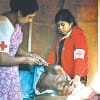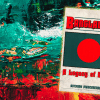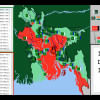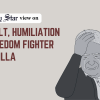Rest in peace, warrior, your battle won

It rained the day they laid the warrior to rest. The gathering at the graveyard was small, but he had fought in the Liberation War, he had lost his right eye in that war, and he was laid to rest with full military honours. The last post was played before they laid him down in the arms of Chaity, his baby daughter who had passed away at the age of nine months in 1986, and whose loss Komol perhaps felt more poignantly than the loss of his eye.
Masroor ul Haq Siddiqi Bir Uttam, better known to family and friends as Komol Siddiqi, passed away in the early hours of October 7. I had last met him a little over a year ago, on September 15. A portion of his living room could be called "a Liberation War corner." Apart from a poster of our war martyrs, there was a poster of the sector commanders, and photos of him receiving awards from two different prime ministers of two different parties. There was also a group photo of victorious freedom fighters, one of whom included a bearded Komol. I had not seen the photo before. Komol told me that a few years ago someone had given him the photo taken after the group had liberated Narail.
Age had caught up with Komol as it has caught up with me, but the spirit which had led him to join the war in 1971 was still there. We talked for two hours about the past, about the war, about what it had meant to us. Little did I realise that he would soon suffer a bout of illness that would confine him to a wheelchair and in the end lead to his passing. He was fortunate to be able to attend the marriage of his younger daughter in late August.
The youngest of five brothers, Komol Siddiqi was born on September 18, 1941, to Wajeda Ahmed in New Delhi, where his father, Z Ahmed, was working. It was one of the rare times that the family were together. Komol's mother usually remained with the family in Magura while his father was stationed in New Delhi, moving when the government offices did to Shimla. Mr Ahmed passed away while Komol was still very young.
It was the determination of Komol's mother and later the support of his eldest brother—who gave up his dreams and joined the army—that enabled Komol and his brothers to go to school and college. Komol got admission to Ahsanullah Engineering College, which in 1962 was upgraded to East Pakistan University of Engineering and Technology, the present Bangladesh University of Engineering and Technology (BUET). Graduating in 1963, he immediately got a job in the Water and Power Development Authority.
Komol was a carefree young man, fond like the rest of his family of music. He was one of the early students of Chhayanat, learning to play the tabla. He was also imbued with the spirit of Bengali nationalism that had gone into the creation of Chhayanat.
In 1971, after the war broke out, he and a brother crossed over to India to join the fighting. For three months, Komol worked with the government-in-exile. Then, while his brother—known as Baby Siddiqi—remained in Kolkata, Komol left to take up arms. He fought in Jessore, Narail, and Faridpur.
On December 7, he and his troops liberated Narail. Nine days later, on December 16, General Niazi signed the instrument of surrender. The war was over. Bangladesh was free.
However, on December 15, the war was not yet over. Bhatiapara, then in Faridpur district, was still under the control of Pakistani troops. Bhatiapara was strategically very important for the Pakistan Army, as it was through the wireless station located there that communication was maintained with the rest of the country. Under the orders of his sector commander, Major Abul Manzoor, Captain Siddiqi, as he was called, proceeded to the area with his troops. During the battle Komol was shot in the right eye.
Komol should have died that day, but, thanks to his fellow soldiers, he was moved immediately to a hospital in Alipur. He was so badly injured that the doctors there believed that he could not survive. The news of his injury reached his friends in Kolkata, among them Aly Zaker. The friends rushed to the hospital. They asked about wounded freedom fighters and were shown a heap of dead bodies. Terrified that one of the bodies would be that of their friend, they searched through the corpses. Komol was not there.
Fortunately, Komol had been moved to the army hospital. Dr Madan, an army doctor there, had also treated Major Khaled Mosharraf. Thanks to Dr Madan, Komol's life was saved, but his eye could not be saved and the right side of his face was terribly disfigured. Komol returned to Dhaka where Ejazul Haq, known to his friends as Emran, took him to see the president, Justice Abu Sayeed Choudhury. Emran had learned that a group of badly injured freedom fighters were being sent for medical treatment to Germany. He hoped that Komol could be included in that group.
Komol was in Germany for nine months undergoing surgery and facial reconstruction. The doctors there did the best they could and asked him to return for plastic surgery. He didn't. He was content with the reconstruction that had been done.
The poet Abu Zafar Obaidullah wrote a memorable poem in honour of Komol, called "Komoler Chokh."
Komolke chino tumi,
Shundor sutham deho,
Prodipto chokh,
Dupur roder moto,
Tibra prokhor.
(Do you know Komol,
The handsome, sturdy young man,
With radiant eyes,
Resplendent as the afternoon sun,
Keen and sharp.)
Just one bullet, the poet says, tore away that young man's right eye. An elegy for Komol's eye, the poem is also a tribute to all those who like Komol fought in the war. Some lost their limbs, some lost their lives, Komol lost his eye. Komol, as he often said himself, was only one of the soldiers in a people's war.
Komol was honoured for his bravery in the war and awarded the Bir Uttam. Sadeque Hossain Khoka, then mayor of Dhaka, honoured several freedom fighters by naming roads after them. One of these roads was named after Komol.
Komol was fortunate to find an understanding, loving wife in Syeda Rokeya, who supported him during all the years of their marriage. His eldest daughter was suffused with the same nationalistic spirit as her father. A brilliant student, she refused a scholarship to the famous Lahore University of Management Sciences, because it would be a gesture of disloyalty to her father who had fought against the Pakistan Army. How could she accept a gift from those who had robbed her father of his eye, taken countless lives, dishonoured countless women?
Though Komol accepted state invitations and did speak on occasions, he did not like to take credit for his role in the war. It was a people's war, he often said. He did not support the special quota for children and grandchildren of freedom fighters. We did not fight to get benefits and special concessions, he would say. Had he been well in July and August, perhaps he would have stood beside the youth and supported the anti-quota movement.
Rest in peace, warrior. You won the battle. It is for the new generation to preserve the victory.
Niaz Zaman is a retired academic, writer and translator.
Views expressed in this article are the author's own.
Follow The Daily Star Opinion on Facebook for the latest opinions, commentaries and analyses by experts and professionals. To contribute your article or letter to The Daily Star Opinion, see our guidelines for submission.

 For all latest news, follow The Daily Star's Google News channel.
For all latest news, follow The Daily Star's Google News channel. 










Comments